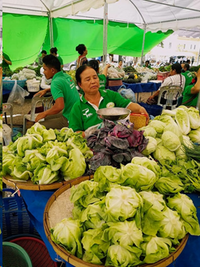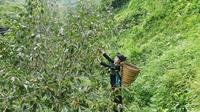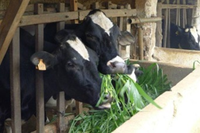Policy Brief
A policy brief is a concise summary of a particular issue, the policy options to deal with it, and some recommendations on the best option.
It is aimed at government policymakers and others who are interested in formulating or influencing policy
1. Boosting the demand for organic products: the role of consumer trust and product availability
Author: Chitpasong Kousonsavath (National University of Laos, Faculty of Agriculture), Isabelle Vagneron (CIRAD), Maiyer Xiong (National University of Laos, Faculty of Agriculture)
Summary: The organic sector in the Lao PDR is still in its infancy but has strong roots –the institutional setting is well developed. With high barriers to organic exports, the domestic market is likely to play a crucial role in the sector’s development. It is therefore important to understand the attitude of Laotian consumers towards organic products. The low level of domestic consumption of organic products can be explained by the lack of information about organic agriculture and by low consumer trust in local certification. To boost organic farming, several measures should be taken, which include: clearly differentiating organic standards from other standards, developing alternative certification methods and improving the availability of organic products.
2. Placing value chain stakeholders at the core of Geographical Indication in Vietnam
Author: DANG Duc Chien (RUDEC), Delphine MARIE-VIVIEN (CIRAD)
Summary: Geographical Indications (GIs) are indications of products whose qualities or reputation is attributable to their place of origin. Based on specifc know-how and the natural elements of the environment, GIs protect the value of the products and provide benefts for value chain stakeholders (producers, processors, traders, etc.), while supporting biodiversity and traditional knowledge in the territory. GIs are of growing importance in international trade, as illustrated by the renowned nuoc mam Phu Quoc (fsh sauce), Champagne, Basmati rice, Rooibos herbal tea, Kampot pepper, Parmigiano Reggiano cheese or Kobe beef. Vietnam is very active in this feld, with 54 GIs registered at the National Offce of Intellectual Property (NOIP) for Vietnamese products up to 2017. The frst law on the appellation of origin was passed in 1995, then remodeled in 2005 as the Intellectual Property Law. However, in Vietnam, GIs are underused by value chain stakeholders, who do not understand the concept. In addition, consumers do not recognize GIs. GI protection has consequently only led to limited changes in stakeholder practices and only limited beneft. In our research, we identifed their management system as a major constraint for GI use.
3. Building scenarios for Vietnam’s dairy sector by 2030
Author: NGUYEN Mai Huong, Jean-Daniel CESARO, Guillaume DUTEURTRE, Bruno DORIN
Summary: In Vietnam, the emergence of large commercial farms and even of some “mega-farms”, questions the future of the dairy sector. Is social, economic and environmental sustainability of dairy farming likely to be affected by this rapid farms’ upscaling? The Revalter foresight study depicted 3 contrasted plausible scenarios for the dairy sector by 2030 in order to challenge this rapid transformation. This foresight exercise was conducted through participatory scenario planning with local stakeholders and with the use of a quantitative model. One of this scenario accommodates different farm models in a complementary approach. Appropriate policy actions are needed to ensure the coexistence of the different types of farms in view of balancing the supply and demand, as well as adapting to the puzzles of local land, rural labor and the environment.



